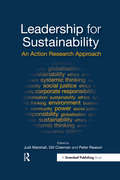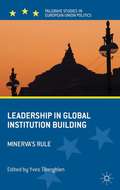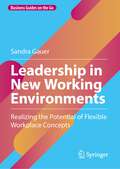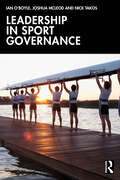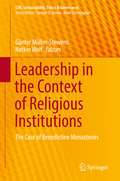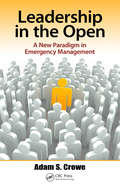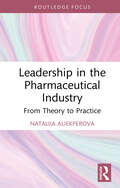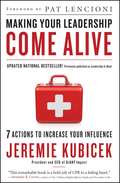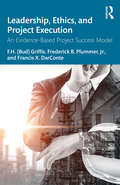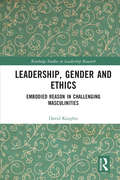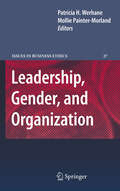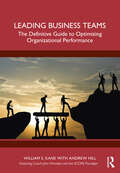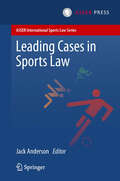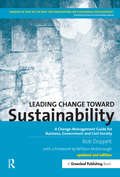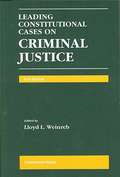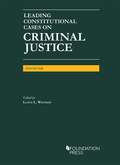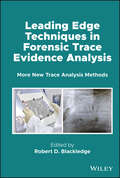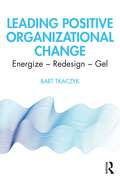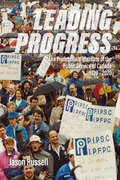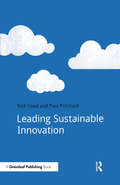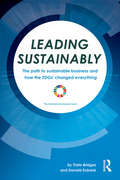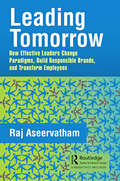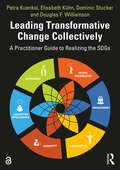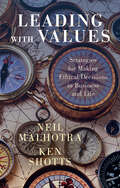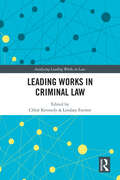- Table View
- List View
Leadership for Sustainability: An Action Research Approach
by Peter Reason Judi Marshall Gill ColemanThose who advocate moving towards sustainability debate how change can be achieved. This book focuses on what it means to take up leadership for sustainability, from a variety of organizational and social positions, and considers the consequences of different strategies and practices for influencing change.
Leadership in Global Institution Building
by Yves TiberghienBetween 1995 and the present day, the world has undergone significant advances in international law, norms, and institutions. Progress was particularly intense in the fields of global environment, human security, cultural diversity, and human rights. This book reveals the key role played by the European Union, Japan, and Canada in this process.
Leadership in New Working Environments: Realizing the Potential of Flexible Workplace Concepts (Business Guides on the Go)
by Sandra GauerThis book discusses the challenges that modern and flexible workplace concepts pose for managers. In particular, it addresses the uncertainties and stress factors that employees face when working in multi-space environments and how they become attached to their workplace. Drawing on a hybrid methodological approach that combines a literature review with practical lessons learned as a workplace change consultant, it offers managers concrete advice on how to lead in multi-space environments. This book aims to reduce the uncertainties and stressors caused by new work environments, and ideally to transform them into growth opportunities for the entire company. Providing concrete solutions, it represents a valuable asset for managers, HR professionals, and workplace initiative leaders alike.
Leadership in Sport Governance
by Ian O'Boyle Joshua McLeod Nick TakosThis is a concise introduction to leadership and governance theory and how they are applied in sport. Presenting a series of case studies from around the world, the book offers a detailed guide to best practice in the leadership of sport boards and organisations. Drawing on cutting-edge research, the book sets out the core concepts and principles of good leadership and good governance, explaining their importance in an era in which sport organisations have become increasingly bound by legal frameworks and subject to greater calls for accountability from wider society. The book analyses the key issues related to leadership in sport governance, including leadership styles with a focus on authentic leadership; intra-group dynamics; managing conflict and trust; leading in multi-layered networks; strategic leadership; and diversity, equity, and inclusion (DEI); and it considers the differing requirements of sport leadership in different geographical locations, under varying challenges and pressures. Full of illuminating cases, data and examples, this is an invaluable reading for any course in sport business and management and a useful primer for any sport business professional looking to improve their professional knowledge.
Leadership in the Context of Religious Institutions: The Case of Benedictine Monasteries (CSR, Sustainability, Ethics & Governance)
by Günter Müller-Stewens Notker WolfThis book explores opportunities and limitations with regard to transferring knowledge and tools from the corporate world to manage monasteries or other types of religious institutions. To do so, the contributing authors analyze both the ideological and practical implications of employing modern organizational theory in the context of religious institutions, and seek to strike a balance between preserving traditions and promoting modernization. In this regard, they draw on experience gained in the course of long-standing collaborations between religious institutions, such as monasteries, and business and management schools.
Leadership in the Open: A New Paradigm in Emergency Management
by Adam CroweAs a relatively young field, emergency management has already undergone considerable evolution and change. And now that Web 2.0 technologies and social media sites such as Facebook and Twitter have become inherently ingrained in all facets of our lives, emergency managers must once again re-evaluate best practices and standardized approaches.Provid
Leadership in the Pharmaceutical Industry: From Theory to Practice (Routledge Focus on Business and Management)
by Nataliia AliekperovaLeadership in the Pharmaceutical Industry focuses on leadership in pharmaceutical organisations at three levels: individual, team, and organisational. At the individual level, it covers leadership basics, theories, types of leaders, differences between leaders and managers, leadership traits and skills, and systems thinking. At the team level, it explores leadership styles, the leader’s interaction with the team, and employee motivation, including the use of intrinsic motivational factors. At the organisational level, it examines the leader’s role in creating and maintaining organisational culture, forming and implementing organisational strategy, and managing organisational changes.The book also addresses the specifics of the pharmaceutical industry, including the types and characteristics of innovations and the ethics of leader behaviour, emphasising the importance of ethical leadership. Notably, leadership issues are illustrated with practical cases featuring prominent leaders such as Paul Janssen, Daniel Vasella, Charles Walgreen III, John C. Martin, Roy Vagelos, Albert Bourla, Kiran Mazumdar-Shaw, and Filya Zhebrovska. These leaders were or are involved in creating, manufacturing, and providing patients with pharmaceutical products.The book is designed to benefit readers from various business sectors, with the primary audience being academics, students, and individuals interested in leadership in the pharmaceutical industry.
Leadership is Dead
by Jeremie KubicekAnyone can make an impact. All you need is influence--the most potent professional asset on the planet. The problem is that influence is also the most underused asset on the planet. And the primary reason is that the enemy of influence is a universal human trait: self-preservation. You guard your ideas, your status, and your reputation. Within your self-constructed walls you must cast safer visions, take smaller risks, and accept shallower relationships to ensure the security of all you are protecting. This is the downside of self-preservation: While your walls protect you and yours from demise, they also restrict your influence. You must break down your walls of self-preservation and sacrifice your security for the sake of others. Only then does the escalating paradox of personal generosity come into play: The more you give, the more you receive. This book shows that the key to effective leadership is learning how to influence in a way that engenders greater trust, stronger partnerships, and more impactful endeavors.
Leadership, Ethics, and Project Execution: An Evidence-Based Project Success Model
by F.H. (Bud) Griffis Frederick B. Plummer Francis X. DarConteLeadership, Ethics, and Project Execution provides a masterclass in the project and people management skills that set apart the most accomplished design and construction professionals. This textbook for graduate and advanced undergraduate students distils the insights gleaned over the authors’ decades of experience in academia and industry into actionable principles for success in a notoriously demanding field. Combining real life case studies with original research, Leadership, Ethics, and Project Execution points the way from the classroom to the jobsite. Interactive exercises allow readers to take the role of junior project managers and other emerging professionals and reason through the ethical dilemmas surrounding building projects from the initial bid to completion. Chapters on stakeholder alignment, productivity, and project success ensure that aspiring leaders’ business decisions are as economically sound as they are ethically correct. From its accessible, conversational tone to the lifetime’s worth of construction wisdom it shares, Leadership, Ethics, and Project Execution offers an extended mentoring session with three giants of the building industry.
Leadership, Gender and Ethics: Embodied Reason in Challenging Masculinities (Routledge Studies in Leadership Research)
by David KnightsThis book has a clear concern to offer a distinctive way of studying leadership so that it might be practiced differently. It is distinctive in focusing on contemporary concerns about gender and ethics. More precisely, it examines the masculinity of leadership and how, through an embodied form of reasoning, it might be challenged or disrupted. A central argument of the book is that masculine leadership elevates rationality in ways that marginalize the body and feelings and often has the effect of sanctioning unethical behavior. In exploring this thesis, Leadership, Gender and Ethics: Embodied Reason in Challenging Masculinities provides an analysis of the comparatively neglected issues of identity/anxiety, power/resistance, diversity/gender, and the body/masculinities surrounding the concept and practice of leadership. It also illustrates the arguments of the book by examining leadership through an empirical examination of academic life, organization change and innovation, and the global financial crisis of 2008. In a postscript, it analyses some examples of masculine leadership in the global pandemic of 2020. This book will be of interest generally to researchers, academics and students in the field of leadership and management and will be of special interest to those who seek to understand the intersections between leadership and gender, ethics and embodied approaches. It will also appeal to those who seek to develop new ways of thinking and theorizing about leadership in terms of identities and insecurities, power and masculinity, ethics and the body. Its insights might not only change studies but also practices of leadership.
Leadership, Gender, and Organization
by Mollie Painter-Morland Patricia WerhaneThis text provides perspectives on the way in which gender plays a role in leadership dynamics and ethics within organizations. It seeks to offer new theoretical models for thinking about leadership and organizational influence. Most studies of women's leadership draw on an ethics of care as characteristic of the way women lead, but as such, it tends towards essentialist gender stereotypes and does little to explain the complex systemic variables that influence the functioning of women within organizations. This book moves beyond the canon in exploring alternative paradigms for thinking about leadership and gender in organizations. The authors draw on the literature available in systems thinking, systemic leadership, and gender theory to offer alternative perspectives for thinking about the ways women lead. The book offers invaluable theoretical perspectives and insightful narratives to graduate students and researchers who are interested in women's leadership, gender and organization. It will be of interest to all women in leadership positions, but specifically to those interested in understanding the systemic nature of leadership and their role within it.
Leading Business Teams: The Definitive Guide to Optimizing Organizational Performance
by Andrew Hill William S. KaneIn a rapidly changing world, businesses must create a high-performing, metrics-driven workplace environment characterized by respect, inclusion, teamwork, innovation, and overall harmony—and it must be manageable and sustainable. This book shows that returning to managerial basics will provide the way forward, as exemplified by legendary UCLA basketball coach John Wooden, the model for a new people management pathway: the SCORE paradigm. Generally considered the greatest coach in history, John Wooden’s recipe for team success was unique, culture-based, and ahead of its time. Building upon Wooden’s 21 coaching principles and his own 35 years of experience as a human resources leader, Bill Kane has created the SCORE framework to guide people managers in creating and nurturing effective teams and steering their organizations through times of change: • Staffing: Attracting and selecting talent • Cultivating culture: Defining how people should interact • Organizing and planning: The need for direction and focus • Reinforcing desirable behavior: Managing performance • Engaging your team: A leader’s role and responsibility Enlivened with stories from the careers of Coach Wooden, Andy Hill (a three-time national champion under Coach), and the author, the book clearly explains why each coaching principle works in practice and provides examples of success, as well as pitfalls to avoid. Readers will learn how to get the right people on their team, create meaningful participative and inclusive management practices, build a winning organizational culture, and achieve heightened results. New and experienced people managers and leaders in corporate settings, as well as business and organizational psychology students, will appreciate this timeless reference tool, a roadmap to help people managers—as their own “work-in-progress”—develop strategies for success based upon a proven and simple model.
Leading Cases in Sports Law
by Jack AndersonThis book accounts for over 25 of the most influential cases in international sports law, as written by some of the leading authorities in the area. Authors from Europe, the United States, Australia, South Africa, Canada and New Zealand trace the evolution of this emerging discipline of law through an analysis of individual cases, as discussed under a number of key debates and themes in contemporary sports law, including: the "public" nature of legal disputes in sport; player employment mobility litigation; doping and the spirit of sport; TV rights holding proceedings; and enduring themes in sports law such as on-field violence, spectator safety, animal welfare and gender equality. Valuable for sports law academics, arbitrators and practitioners, sports administrators and governing bodies, but also for students (postgraduate and undergraduate) and all those with an interest in international sports law.
Leading Change toward Sustainability: A Change-Management Guide for Business, Government and Civil Society
by Bob DoppeltAs the world struggles to cope with the growing threat of a global carbon crisis, Doppelt has revised one of the best books ever written about change management, leadership and sustainability to focus on de-carbonisation. Doppelt's research, presented in this hugely readable book, demystify the sustainability-change process by providing a theoretical framework and a methodology that managers can use to successfully transform their organisations to embrace sustainable development. Filled with case examples, interviews and checklists on how to move corporate and governmental cultures toward sustainability, the book argues that the key factors that facilitate change appear in the successful efforts at companies such as AstraZeneca, Nike, Starbucks, IKEA, Chiquita, Interface, Swisscom and Norm Thompson and in governmental efforts such as those in the Netherlands and Santa Monica in California. For these and other cutting-edge organisations, leading change is a philosophy for success. Leading Change toward Sustainability has been used by change leaders around the world to guide their internal global warming and sustainability organisational change initiatives. This new edition is essential reading for leaders from all types of organisations.
Leading Constitutional Cases on Criminal Justice (2008 Edition)
by Lloyd L. WeinrebThis leading casebook provides Supreme Court cases generously edited for classroom use and presented in a simple, straightforward format. The casebook is updated annually. The new edition is published in August, in time for fall classes, and includes cases decided through the end of the preceding Term of the Supreme Court. Information will be forthcoming about cases decided in the current Term of the Court that will be included in the 2010 edition.
Leading Constitutional Cases on Criminal Justice (University Casebook Series)
by Lloyd WeinrebThe leader in its field, Leading Constitutional Cases on Criminal Justice is updated annually and includes all significant cases decided in the preceding Term of the Court. <p><p>Cases are edited generously and presented in a simple, straightforward format, for use in courses on constitutional law and criminal justice. The 2018 edition is published in August and is available for fall classes.
Leading Edge Techniques in Forensic Trace Evidence Analysis: More New Trace Analysis Methods
by Robert D BlackledgeLeading Edge Techniques in Forensic Trace Evidence Analysis In-depth exploration of the latest methodologies, tools, and techniques for analyzing trace evidence In Leading Edge Techniques in Forensic Trace Evidence Analysis, distinguished and highly qualified contributors cover the significant advances in methodology and instruments that are now being used to analyze trace evidence in forensic laboratories, including new techniques used to determine authenticity of objects and artifacts (such as Combined Raman/LIBS Microscopy) and those used to analyze surface treatments (such as py-GC-PARCI-MS). The work also covers new evidence types, such as surface-modified fibers, microscopic particles, and shimmer, and provides detailed explanations and practical examples of all of the aforementioned topics. Among the topics covered are: Forensic analysis of shimmer particles in cosmetics samples, glitter and other flake pigments, and x-ray photoelectron spectroscopy Surface acoustic wave nebulization mass spectrometry, forensic applications of gas chromatography vacuum ultraviolet, and spectroscopy paired with mass spectrometry Density determination and separation via magneto-Archimedes levitation and elemental imaging of forensic traces with macro and micro XRF Characterization of human head hairs via proteomics and Raman and surface-enriched Raman scattering (SERS) for trace analysis With detailed explanations of modern methodologies, tools, techniques, and evidence types in trace evidence forensics, along with helpful guidance to put covered concepts into practice, Leading Edge Techniques in Forensic Trace Evidence Analysis serves as an invaluable hands-on reference for scientists in forensic laboratories worldwide.
Leading Positive Organizational Change: Energize - Redesign - Gel
by Bart TkaczykAlthough many organizations see the need to transform and to reinvent themselves, for far too many leaders, ‘change’ and ‘failure’ are virtual synonyms. In fact, most organizational change efforts fail. But that needn’t be the case, and help is at hand. Leading Positive Organizational Change, an alternative way to think about organizational change and development, is a strategic, learnable discipline that can re-energize and re-imagine your enterprise, and release the potential for change – delivering a positive, creative future and breakthrough bottom-line results. Written by an award-winning expert in positive organization development and change leadership, this book provides executives, change leaders, and change leadership teams with a step-by-step guide for collaboratively crafting and executing a change strategy that aligns with organizational objectives so as to fuel their future. With a strong science-backed and field-tested ‘how to’ approach, and with a radical focus on organizational positivity, super-flexibility and renewal, collective design thinking and applied imagination, this highly practical book features: A ToolBox of 30 powerful, imaginative (and time-saving!) tools for you to use in practicing leading positive organizational change and carrying through your change program – with example templates and worksheets, concise notes and ideas from numerous complex global projects. Lead-ins to each chapter that are a fundamental feature of the book, representing a springboard to a chapter and serving the purpose of awakening interest in the topic. Dialogic Reflection for Professional Team Development, at the start of each chapter, that enables you (and your team as a whole) to reflect on and discuss some thought-provoking questions, linking to the chapter and helping to contextualize your learning. Industry Snapshots that explore current issues and trends in one of the fastest-growing professions and industries – coaching and consulting. Windows on Practice that demonstrate how issues are applied in real-life business situations, offering a range of interesting topical illustrations of positive change leadership in practice, relating the core concepts of the book to real-world settings. Summary Propositions, at the end of each chapter, that recap and reinforce the key takeaways from the chapter. References to help you take your learning and development further. Tkaczyk’s engaging, reflective, task-based book equips the change leader and leadership teams with the skills needed to navigate chaos and the unexpected, to renew your business and create winning change. This action-based workbook can be used in a variety of business settings, among others, executive leadership team meetings, organization development and change consulting, design-led strategy retreats, human resource development consultancy, executive 1:1 and team coaching, leadership boot camps, design thinking workshops and sprints, innovation labs, and executive education and MBA courses – as a handy additional text in either an organization development and change or human resource management class. It can also be used in a flexible strategic transformation program – with the flow of the change execution process mapped within the context of a specific change initiative.
Leading Progress: The Professional Institute of the Public Service Canada 1920–2020
by Jason RussellOn February 6, 1920, a small group of public service employees met for the first time to form a professional association. A century later, the Professional Institute of the Public Service Canada (PIPSC) is a bargaining agent representing close to 60,000 public sector workers, whose collective efforts for the public good have touched the lives of every Canadian. Published on the centennial of PIPSC’s founding, Leading Progress is the definitive account of its evolution from then to now—and a rare glimpse into an under-studied corner of North American labour history. Researcher Dr. Jason Russell draws on a rich collection of sources, including archival material and oral history interviews with dozens of current and past PIPSC members. The story that unfolds is a complex one, filled with success and struggle, told with clarity and even-handedness. After decades of demographic and generational shifts, economic booms and busts, and political sea change, PIPSC looks toward its next hundred years with its mission as strong as ever: to advocate for social and economic justice that benefits all Canadians.
Leading Sustainable Innovation
by Paul Pritchard Nick CoadSustainability will play an increasingly key role in the innovation process within businesses. Leading companies are already integrating these agendas, and preparing their sustainability executives to take the lead. This book demonstrates why sustainability requires innovation; explains how this opportunity can be grasped by sustainability executives; outlines the skills they will need to learn to lead on sustainable innovation; and outlines key trends in sustainable innovation and in managing innovation. Coad and Pritchard provide an overview of mainstream innovation, and draw out common characteristics of successful programmes, such as a corporate culture whose systems promote innovation. They highlight developments such as mobile technology, social media and collaborative consumption which transform the way consumers interact with companies. Viewed alongside emerging ideas on sustainability, such as the circular economy, this points to a clear need for a new set of innovation skills. Companies will face challenges in realizing these opportunities, in particular the development requirements for sustainability executives and broader organizational learning. This book is for companies who want to take advantage, and the sustainability executives who will be leading the way.
Leading Sustainably: The Path to Sustainable Business and How the SDGs Changed Everything
by Trista Bridges Donald EubankThe business world is at an important crossroads. The age of the stakeholder is rapidly superseding that of the shareholder as climate change and political and societal shifts upend years of seeming prosperity. To move past this agitated age, business and society must learn to lead sustainably by putting purpose on equal footing with profit. The first step is understanding what’s meant by sustainability and how it offers an opportunity for both business and society. Inspired by the launch of the 2030 United Nations Sustainable Development Goals (SDGs), the book captures the ideas of more than 100 change makers from around the world about how business is putting sustainability at the core of strategy to survive, thrive, and realign its interests with society’s. Leading Sustainably looks at how sustainability has evolved in a business context, offering powerful insights, key facts, and guidance on building sustainability capability within companies, measuring and managing impact, sustainable finance’s transformation, and other topics critical to aligning businesses’ central activities with sustainable principles. The book introduces five vignettes profiling best-in-class companies that were sustainable from the start and international case studies on business sustainability efforts, spanning industries from hospitality to waste management, fashion, finance, and more. Finally, Bridges and Eubank provide frameworks and in-depth direction firms can leverage when accelerating their transition to more sustainable business models. The book is a perfect guide for mid-level to senior managers seeking to understand this fast-changing business environment, how to factor sustainability into their decision-making, and why the SDGs changed everything.
Leading Tomorrow: How Effective Leaders Change Paradigms, Build Responsible Brands, and Transform Employees
by Raj AseervathamMaintaining good business leadership in a world of rapidly changing expectations levied by customers, investors, society, governments and employees is a challenge. These stakeholders are increasingly making choices about if or how they support businesses – through the purchase of their products and services, shareholdings and financing, regulatory approvals, and even experiences working for them – based on not just what a business does, but how it does it. We are seeing shifts in stakeholder sentiments that manifest in a greater expectation that businesses work with society in addressing society’s contemporary concerns. This greater good that businesses bring is rewarded by a greater brand awareness, connection and loyalty, which in turn provides businesses with an underlying strategic advantage over the competition with its customers, investors and other stakeholders. But this greater good cannot be faked with PR and bought media; in an increasingly connected world populated by an increasingly savvy millennial stakeholder base, authentic leadership and its ability to effect cultural shifts in the DNA of businesses is essential. Failure to do so will likely result in shorter and less successful tenures of Board members and C-suite leaders as this business trend spreads. This book looks at how the emerging generation of leaders must change paradigms and transform their employees to do more than just operate a business. It examines how to effect culture shifts that are necessary to innovate businesses so that they simultaneously meet market needs while meeting stakeholder expectations on concerns as varied as ethical business conduct, labor practices, climate change, responsible use of diminishing natural resources and contribution to socio-economic challenges in their market catchments. These are perspectives and skills that are still glossed over, by academic and professional institutions, as they develop the leaders of the future. Essentially, this book: • Articulates the strategic business case for doing good in a good business; the why, and where this trajectory is leading • Provides strategies to lead authentically on the array of issues that provide key stakeholders – customers, investors, governments and employees – with a greater reason to engage with and build loyalty to the business • Provides strategies to energize and spark innovation among his/her employees in an organization on these issues so that transformative power is harnessed.
Leading Transformative Change Collectively: A Practitioner Guide to Realizing the SDGs
by Petra Kuenkel Dominic Stucker Elisabeth Kuhn Douglas F. WilliamsonThis book directly helps decision-makers and change agents in companies, NGOs, and government bodies become more proficient in transformative, collaborative change in realizing the SDGs. This practitioner’s handbook translates a systemic – and enlivening – approach to collaboration into day-to-day work and management. It connects the emerging practice of multi-stakeholder collaboration to easily understandable models, tools, and cases. Numerous, concrete cases not only bring this methodology to life, but also help identify the challenges and avoid common mistakes. The book can be used as a guide to apply a breakthrough approach for navigating the complexity of stakeholder systems, designing results-oriented process architectures, ensuring the success of cross-sector change initiatives, and enlivening collaboration ecosystems for SDG implementation. It is designed to enhance high quality stakeholder engagement, dialogue, and collaboration. A must-read, the book sets a new standard for the collaborative implementation of Agenda 2030 and is a foundational guide for leading sustainability transformations collectively to achieve climate change mitigation, social integration, equitable value chains, and broad sustainability challenges.
Leading With Values: Strategies for Making Ethical Decisions in Business and Life
by Neil Malhotra Ken ShottsAs societies become more polarized, there is increasing pressure for business leaders to have a sense of purpose and to make moral decisions. Being a good leader requires both a keen understanding of the realities of human decision making as well as an analysis of what is right and wrong. This book integrates lessons from three intellectual traditions – psychology, philosophy, and political economy – to guide readers on a journey to rigorously explore their values and decision making. The authors begin by examining people's intuitions about right and wrong. They then clarify principles that embody these intuitions and help readers engage with others whose intuitions or principles differ from their own. Ultimately, this book teaches readers how to be strategic as they lead with their values: as individuals, as designers of organizations, and as businesspeople interacting with societal institutions.
Leading Works in Criminal Law (Analysing Leading Works in Law)
by Lindsay Farmer Chloë KennedyThis book analyses a selection of leading works in the criminal law to ask questions about how the modern discipline of criminal law has developed, how it has been deployed in colonial and post-colonial contexts, and how criminal law scholarship has engaged with traditionally marginalised perspectives such as feminism, queer theory, and anti-carceral and abolitionist movements. The works analysed range from Macaulay’s Indian Penal Code (1837) to more recent textbooks and monographs on criminal law, and their jurisdictional reach extends to India, Canada, Australia, Malawi, the UK and the USA. The contributing authors include scholars, activists and legal practitioners, each of whom explores the intellectual development and geographical reach of ‘Anglo’-criminal law via the work they analyse. Across the collection, the editors and contributors address the question of what it means to be a leading work in criminal law. It will be a valuable resource for students, academics and researchers working in the area of Criminal Law.
